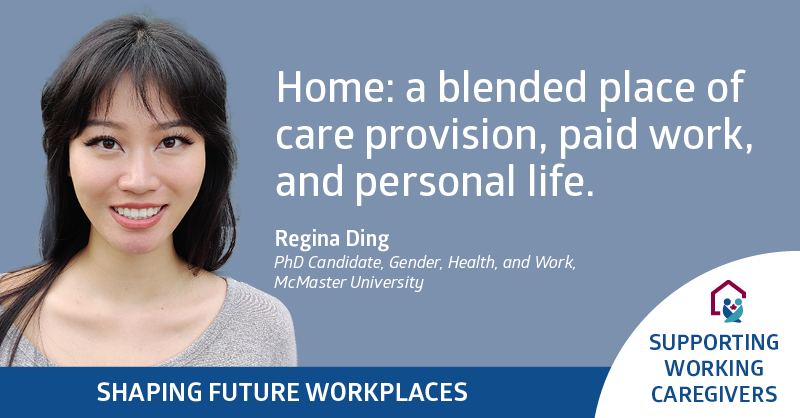Caregiving and work‐from‐home during COVID‐19
For many Canadians, the home is increasingly becoming the nexus of one’s domestic, paid work and caregiving world.
This paper examines the impact of the shift to work-from-home on carer-employees (CEs). Guided by place theory and informed by in-depth interviews with five carer-employees, we have added to the body of knowledge on the changing relationships that carers have had with their home and work landscapes during COVID-19.
The pandemic has undeniably changed the reality of many people’s lives. One of the groups most affected by the fallout of this global pandemic are CEs, who are juggling both employment and caregiving for a loved one due to health, disability, or age-related reasons.
In the summer/fall of 2020, we conducted semi-structured interviews with working carers (n = 5) from across Canada, all of whom were working in a large‐sized organization in the oil and gas industry. The aim was to understand the changing meanings of home as a place for care during the pandemic.
While our study parameters were open to all carers, our recruited sample was composed of CEs providing care to older relatives. Overall, most participants in our sample were female, in non‐management type positions, and had moderate to high caregiving responsibilities.
Four themes were identified through the participant interviews:
- New meanings of place – describes how COVID‐19 precautions transformed one’s previous association with place. There were three sub‐themes: 1) isolation of home from the external world; 2) home as a workplace, and 3) long‐term care and retirement homes.
- Caring from a distance – describes the greater emphasis placed on the emotional aspect of care provision, given that physical caregiving is more difficult and dangerous during COVID‐19.
- Caregiving and work conflicts– describes conflicts when both activities are occurring out of the same physical space; these conflicts are recognized to be bi‐directional, although carers indicate that work conflicts more commonly affect care provision than the other way around.
- Spatiotemporal flexibility in time – describes increased flexibility regarding schedule control in the form re‐contracting of time and space/place.
We found that the shifts created by COVID-19 were nuanced. Generally, the separation of the workplace and the home had been radically eroded, with carers juggling paid work, caregiving, and personal obligations out of the home. This arrangement provided opportunities and benefits, such as increased temporal flexibility, schedule control, a lack of commute time, privacy, and comfort. However, drawbacks included increased care burden, loss of connection with peers and mentoring opportunities, loss of external carer supports, and greater work disruptions.
These findings highlight the caregiving realities of CEs during the pandemic and provide insight to inform strategies for the workplace in a post-pandemic world. We expect that in the future, CEs will seek a hybrid model of work.
Read the published article
ABOUT THE PROJECT
Carers Canada is leading the knowledge mobilization activities for a multi-sectorial research program to spread and scale a carer-friendly workplace standard, known as the Carer-Inclusive and Accommodating Organizations’ Standard (CSAB701-17). Led by Dr. Allison Williams, CIHR Research Chair in Gender, Work and Health at McMaster University, the research program consists of six inter-related sub-projects that will: increase awareness of the standard across Canada; evaluate readiness to change; determine feasibility and cost benefit; embrace cultural competency; consider Indigenous perspectives; and create an international standard. Visit PARTNERSHIP PROJECT SITE here

CIHR/SSHRC Healthy Productive Work Partnership Grant “Scaling up the Career Inclusive Accommodating Organizations Standard” FRN: HWP-146001 (CIHR); 890-2016-3018 (SSHRC).
 Regina DingFebruary 13, 2022
Regina DingFebruary 13, 2022

Caregiving and work‐from‐home during COVID‐19
For many Canadians, the home is increasingly becoming the nexus of one’s domestic, paid work and caregiving world.
This paper examines the impact of the shift to work-from-home on carer-employees (CEs). Guided by place theory and informed by in-depth interviews with five carer-employees, we have added to the body of knowledge on the changing relationships that carers have had with their home and work landscapes during COVID-19.
The pandemic has undeniably changed the reality of many people’s lives. One of the groups most affected by the fallout of this global pandemic are CEs, who are juggling both employment and caregiving for a loved one due to health, disability, or age-related reasons.
In the summer/fall of 2020, we conducted semi-structured interviews with working carers (n = 5) from across Canada, all of whom were working in a large‐sized organization in the oil and gas industry. The aim was to understand the changing meanings of home as a place for care during the pandemic.
While our study parameters were open to all carers, our recruited sample was composed of CEs providing care to older relatives. Overall, most participants in our sample were female, in non‐management type positions, and had moderate to high caregiving responsibilities.
Four themes were identified through the participant interviews:
- New meanings of place – describes how COVID‐19 precautions transformed one’s previous association with place. There were three sub‐themes: 1) isolation of home from the external world; 2) home as a workplace, and 3) long‐term care and retirement homes.
- Caring from a distance – describes the greater emphasis placed on the emotional aspect of care provision, given that physical caregiving is more difficult and dangerous during COVID‐19.
- Caregiving and work conflicts – describes conflicts when both activities are occurring out of the same physical space; these conflicts are recognized to be bi‐directional, although carers indicate that work conflicts more commonly affect care provision than the other way around.
- Spatiotemporal flexibility in time – describes increased flexibility regarding schedule control in the form re‐contracting of time and space/place.
We found that the shifts created by COVID-19 were nuanced. Generally, the separation of the workplace and the home had been radically eroded, with carers juggling paid work, caregiving, and personal obligations out of the home. This arrangement provided opportunities and benefits, such as increased temporal flexibility, schedule control, a lack of commute time, privacy, and comfort. However, drawbacks included increased care burden, loss of connection with peers and mentoring opportunities, loss of external carer supports, and greater work disruptions.
These findings highlight the caregiving realities of CEs during the pandemic and provide insight to inform strategies for the workplace in a post-pandemic world. We expect that in the future, CEs will seek a hybrid model of work.
Read the published article
Regina is a final year PhD Candidate at McMaster University, researching population health and aging. Her dissertation focuses on the program evaluation of a workplace carer intervention for carers. Regina has an interdisciplinary background in life sciences and environmental sciences prior to her work at McMaster, although she has always been interested in knowledge translation and scientific policy.
FAVORITE PASTIME: Most recently, pottery.
Twitter: @DingRegina
LinkedIn: @regina-ding-b53b871a1
ABOUT THE PROJECT
Carers Canada is leading the knowledge mobilization activities for a multi-sectorial research program to spread and scale a carer-friendly workplace standard, known as the Carer-Inclusive and Accommodating Organizations’ Standard (CSAB701-17). Led by Dr. Allison Williams, CIHR Research Chair in Gender, Work and Health at McMaster University, the research program consists of six inter-related sub-projects that will: increase awareness of the standard across Canada; evaluate readiness to change; determine feasibility and cost benefit; embrace cultural competency; consider Indigenous perspectives; and create an international standard. Visit PARTNERSHIP PROJECT SITE here

CIHR/SSHRC Healthy Productive Work Partnership Grant “Scaling up the Career Inclusive Accommodating Organizations Standard” FRN: HWP-146001 (CIHR); 890-2016-3018 (SSHRC).